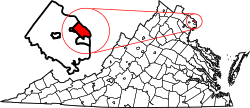Glencarlyn is a residential neighborhood in Arlington County, Virginia.
Contents
- Boundaries
- Glencarlyn landmarks
- Historic Events in Glencarlyn
- Notable Glencarlynites
- References
- External links

Originally created as a summer community for Washingtonians who wished to escape the heat of the city, Glencarlyn was founded by partners Samuel S. Burdett, a former Missouri congressman, and his partner George W. Curtis in 1888. [1]





